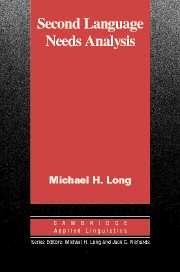Book contents
- Frontmatter
- Contents
- List of contributors
- Acknowledgments
- Overview: A rationale for needs analysis and needs analysis research
- I Methodological issues
- II The public sector
- III The occupational sector
- Chapter 4 Sources, methods and triangulation in needs analysis: A critical perspective in a case study of Waikiki hotel maids
- Chapter 5 Foreign language need of business firms
- Chapter 6 Evaluating the use of multiple sources and methods in needs analysis: A case study of journalists in the Autonomous Community of Catalonia (Spain)
- Chapter 7 “Feet speak louder than the tongue”: A preliminary analysis of language provisions for foreign professional footballers in the Netherlands
- IV The academic sector
- V Analyzing target discourse
- Index
Chapter 7 - “Feet speak louder than the tongue”: A preliminary analysis of language provisions for foreign professional footballers in the Netherlands
Published online by Cambridge University Press: 25 January 2010
- Frontmatter
- Contents
- List of contributors
- Acknowledgments
- Overview: A rationale for needs analysis and needs analysis research
- I Methodological issues
- II The public sector
- III The occupational sector
- Chapter 4 Sources, methods and triangulation in needs analysis: A critical perspective in a case study of Waikiki hotel maids
- Chapter 5 Foreign language need of business firms
- Chapter 6 Evaluating the use of multiple sources and methods in needs analysis: A case study of journalists in the Autonomous Community of Catalonia (Spain)
- Chapter 7 “Feet speak louder than the tongue”: A preliminary analysis of language provisions for foreign professional footballers in the Netherlands
- IV The academic sector
- V Analyzing target discourse
- Index
Summary
Introduction
Anyone interested both in second language acquisition and sport will surely have been impressed by the quality of the English spoken by international tennis stars like Kim Clijsters or Martina Navratilova. Or perhaps the excellent Japanese spoken by top sumo wrestlers Akebono (real name Chad Rowan) and Musashimaru (formerly Fiamalu Penitani), both born and raised in Hawai'i. Equally impressive are those professional footballers and managers who become fluent idiomatic speakers of the languages of their host countries. One thinks of the fluent English of French forward Thierry Henry (Arsenal), and his compatriots Gérard Houllier and Arsene Wenger, managers of England's Liverpool and Arsenal football clubs respectively. How do they do it, we wonder, these conspicuous cases of highly successful foreign language learning? Are they naturally gifted, or are there special factors in their sporting worlds which promote proficiency? Is the fact that we tend to see interviews with foreign sporting stars who are usually also linguistic stars actually an indicator that the great mass of international sporting figures are no better at learning languages than the rest of us? In this chapter we consider the importance of the host language in the lives of foreign professional footballers, with particular emphasis on the situation in the Netherlands.
Language and professional football
There seems to be very little pertinent academic literature on the topic of language learning in international sports settings, with the partial exception of Miyazaki (2001), a book about non-Japanese sumo wrestlers written for a mass audience by an academic.
- Type
- Chapter
- Information
- Second Language Needs Analysis , pp. 200 - 222Publisher: Cambridge University PressPrint publication year: 2005
- 5
- Cited by



